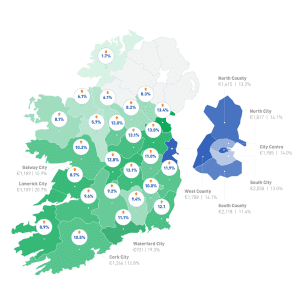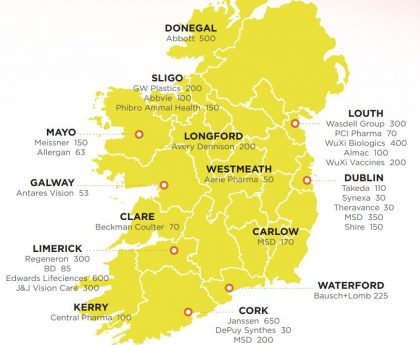General information about Ireland
Population 4.7 million
Cities:
- Dublin City – 554K (Capital)
- Cork City – 125K
- Galway City – 78K
- Limerick City and county – 195K
LANGUAGE
Irish (Gaeilge) is recognised as the first official language of the Republic of Ireland. However, the majority of the population speak English (the second official language) as their first language.
If you want to work in Ireland our clients require a high standard of English both written and oral.
FLIGHTS TO IRELAND
The main airports in Ireland are located in Dublin and Cork. Dublin Airport is by far the busiest, with the largest timetable of global flights connecting with over 180 destinations. More information available at: dub.fltmaps.com
Followed by Cork Airport with 40 destinations: www.corkairport.com
There are also airports in Shannon, Knock and Kerry with limited flight options.
If you’re thinking of moving to Ireland it’s important you consider how often you plan to travel home. Research the frequency, duration and estimated cost of flights before you make the move!
TIP: All airports in Ireland service the UK so you also have the option of flying to one of London’s airports and booking a connecting flight which can sometimes be easier!
Check out kiwi.com for booking connecting flights!
Transportations in Ireland
Dublin being a capital has the largest network of transport systems including the DART and the LUAS.
- Dublin Bus – 90% of buses in Dublin are run by Dublin Bus;
- DART – Commuter rail service that serves Dublin city only;
- LUAS – Tram system that operates in Dublin (limited number of lines, however more being added); and
- for all other cities the main public transport provider is Bus Eireann
Note public transport in Ireland is more expensive than the European average.
Tip: If you are travelling frequently by bus/public transport it is a good idea to buy a LEAP card where you can save approx. 20% on bus fares and no need to carry cash. For further information visit: www.leapcard.ie

Travelling to and from work
Most companies in the Life Sciences sector in Ireland are based around five cities – Dublin, Cork, Limerick, Galway and Waterford. Most facilities can be reached by public transport however the majority of our consultants travel to work by car. This tends to be the most convenient method of transport, as once you move outside the city centre bus times can be less frequent and the high levels of rainfall don’t make for a pleasant wait! If you want to make the most of your time in Ireland and see what the country has to offer, it is a good idea to consider getting a car.
Car insurance in Ireland has increased rapidly in the past few years and is above the European average.
Different companies will provide you with different quotes so make sure you do your research before agreeing to a policy!
Note: You can bring your car to Ireland as a tourist for 6 months but for any longer periods of time
You will need to change your registration plate to an Irish one for a cost. Full details available at: www.citizensinformation.ie
Bike to work
If the above doesn’t appeal, you always have the option to cycle! However there are very few dedicated cycle lanes in Ireland so you will be cycling in the traffic most of the time and in Ireland and it rains a lot! If this doesn’t faze you LSC operate a Bike to Work scheme to save you up to 51% (by salary deduction) off the retail price of bike and equipment of up to €1,000.
Accommodation in Ireland
Finding accommodation in Ireland can be the most challenging issue when relocating.
Rental prices have increased significantly in the past few years as demand increases and supply can’t keep up. Here is an infographic showing the average monthly cost of rental accommodation nationwide.
The following are the most popular websites to search for rental accommodation in Ireland:
It is a must to research accommodation prior to coming to Ireland to see what is available in the area you plan to move to. More often than not there will be multiple people viewing one property so you will need to be proactive and keep your options open. Unlike a lot of European rentals, the majority of rental accommodation in Ireland is already furnished. Most rental properties are not pet friendly so if you’re bringing a pet keep this in mind! You will also need to pay at least one months deposit in advance once you secure a property.
Note: Landlords/letting agents require a reference of employment when renting an apartment/house in Ireland. LSC are more than happy to organise this for all our consultants.

Cost of living in Ireland
Here is some guidance on the average cost of living in Ireland. You’ll also find the option to compare prices with your home country/city! Visit: www.numbeo.com
Opening a bank account in Ireland
If you decide to take a contract in Ireland you’ll need to set up an Irish Bank Account for payment.
To do so you’ll need 2 documents: one valid form of photo ID and a document to prove your address. Your passport, driving licence or national identity card (if you’re an EU citizen) are all valid forms of photo ID. In order to prove your address, you will need to produce one of the following documents:
- a recent utility bill (less than 6 months old);
- a recent bank statement (less than 6 months old); or
- correspondence from a government department or authority.
If you haven’t secured an address in Ireland you can open a bank account as a non- resident. Many banks will accept a utility bill, bank statement or government correspondence with your home country address. However, some banks will require non-residents to provide two proof of address, a character reference and access to your financial history in your home country.
Tip: It’s best to select a branch near to where you will be living in Ireland as you may need to call in person!
Personal public service number
Your Personal Public Service Number (PPS number) is a unique reference number that helps you access social welfare benefits, public services and information in Ireland.
PPS Numbers (Personal Public Service Number) are required for all workers in Ireland. This number is unique to you and is required for your Payroll to be processed. Your PPS Number will be assigned with tax credits which will be applied based on your own personal circumstances.
The process of getting a PPS number is relatively easy however you will first need to secure a contract, and be resident in Ireland before application can begin.
To get a PPS number, you will need to:
- Fill out an application form in the PPS Number Allocation Centre
- Proof of Identity (Passport)
- Evidence of why you need a PPS number (LSC can help with this documentation to confirm you have secured a contract)
- Proof of your address in Ireland
Visit www.MyWelfare.ie to make a booking.
Weather in Ireland
Ireland’s climate is influenced mostly by the Atlantic Ocean. As a result, it doesn’t have extreme temperatures that the other countries at similar latitude would have. The annual average temperature is 9 degrees Celsius. In the summer, the average maximum temperature is 19 degrees Celsius. Meanwhile in winter, the average minimum temperature is 2.5 degrees Celsius.
The average rainfall in Ireland is 800-2,800 millimetres. This is relatively high in the winter and low in the summer. December and January tend to be the wettest months, so make sure to have an umbrella! The daytimes in Ireland are generally long. In June, the sun rises around 05:00 and sets around 21:45. In December, the sun rises around 08:30 and sets around 16:00.
The work culture in Ireland
Ireland is known for its social balance, equality, educated workforce and transparency. As of 2017, Ireland has the second highest minimum wage in Europe and has an unemployment rate of 6.1%.
The typical working week in Ireland is 39 hours from Monday to Friday and office hours are usually between 08:00 and 17:00.
Note: If you are relocating with a family and need to factor in childcare during working hours this will be an additional cost to consider. Ireland currently ranks as one of the most expensive country’s in Europe for the price of childcare. E.G – Average €150 per week per child in Dublin.


